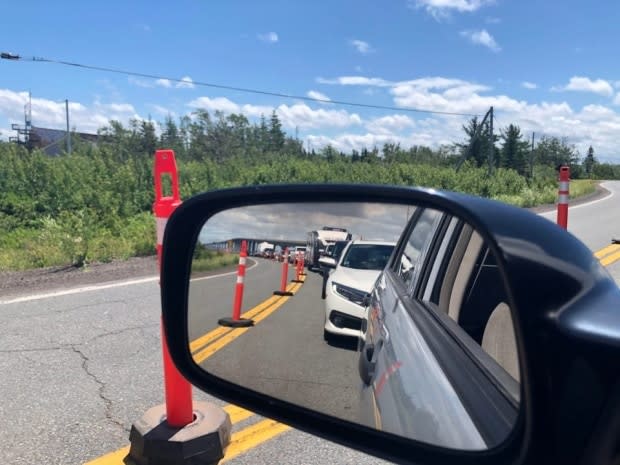Province holds the line as COVID cases spike outside the bubble
New Brunswick officials are sounding a cautious note about opening the Atlantic bubble to the rest of Canada now that cases are spiking in Quebec, Ontario and some western provinces.
Premier Blaine Higgs and Chief Medical Officer of Health Jennifer Russell were both non-committal about a timetable for allowing visitors to enter New Brunswick without having to self-isolate for 14 days.
In a statement, Higgs said "a number of factors" are under consideration as the province contemplates when to open to the rest of Canada.
"We are waiting to see what impacts the opening of schools and universities in our own province might have, as well as any significant increase in cases in other provinces," he said.
Russell said in a statement border restrictions "have been part of our province's success in managing COVID-19, so any changes in that regard would need to be carefully and thoughtfully considered."
Ontario reported 520 new cases Tuesday, its highest number since May. Quebec had 471 cases Wednesday and its daily counts are now the highest since May.
In Edmundston, where people welcomed the extension of the bubble to the neighbouring Témiscouata regional municipality in early August, there was grudging acceptance when the border closed again last week.
"Citizens have expressed some concerns about it, [but] they believe it was the right decision," said Mayor Cyrille Simard.
"People do understand that there was a risk, that the decision was taken for good reasons. But at the same time, the minute that we see the situation is under control hopefully we can open up the bubble again."
Biologist advocates status quo
Biologist Malgorzata Gasperowicz of the University of Calgary, who supports a group of scientists pushing for more aggressive COVID-19 measures, says Atlantic Canada is a success story and it would be foolish to jeopardize it now.
"I wouldn't open at all, until there is a vaccine and until the rest of the world figures out how to eliminate the virus," she said. "You are safe. The problem for Atlantic Canada is the rest of the world.

"You can be as clean, as virus-free as possible, but if the virus is growing outside of your borders, it's difficult to fight all the sparks that are coming in."
The bubble restricts non-essential travel into the region while allowing residents of the four provinces to move around Atlantic Canada without having to self-isolate.
In August, Narrative Research reported that 77 per cent of Atlantic Canadians surveyed were mostly or completely opposed to reopening the regional bubble to outsiders, and 90 per cent of New Brunswickers said they were satisfied with the bubble.
COVID 'elimination'
Gasperowicz says border controls have contributed to low case numbers in the region, so low that they amount to the "elimination" of the virus here.
That term hasn't been used by Public Health officials in New Brunswick.
Gasperowicz is not an infectious-disease expert but studies cell behaviour. She attributes the concept of "elimination" to the group End Coronavirus, which supports lockdowns and border controls to stamp out the disease quickly.

It defines "elimination" as no new cases of community transmission, the quarantining of any new travel-related cases and no open borders with high-case areas.
There have been only seven new cases in New Brunswick in the last four weeks, all of them described as travel-related and all involving patients who were isolating.
"Elimination means no sustained community transmission in a specific region or country … which I think totally applies to the Atlantic bubble," Gasperowicz says.

In her emailed statement Wednesday, Russell did not directly respond to a request for a comment on the term.
"New Brunswick is certainly proud of its success in managing the global COVID-19 pandemic," she said. "However, there is still much to be done."
She urged New Brunswickers to continue washing their hands, maintaining distancing and wearing masks where distancing isn't possible.
In July, Nova Scotia Premier Stephen McNeil said he was getting close to opening to the rest of Canada by ending the 14-day mandatory quarantine period for visitors.
"We can't stay closed forever," he said.

But this week he endorsed comments by the province's chief medical officer that the Atlantic bubble should remain closed to outsiders for now.
"I want you to look around the country and other provinces — their numbers are spiking again and in some cases, they're even worse than before," McNeil said. "This is a worry. If we don't believe there is a second wave coming, look outside of the Atlantic bubble."
Varied restrictions
New Brunswick allows out-of-province workers to come home from the rest of Canada without self-isolating. Non-residents visiting family and friends can enter but must self-isolate.
Nova Scotia also allows visitors to arrive as long as they self-isolate.
New Brunswick opened its borders to two adjacent regions of Quebec in August but closed them to one of them, Témiscouata, last week when cases began increasing.

On Wednesday the province announced that New Brunswickers who own cottages in the area would be allowed to travel there to close their cottages without having to self-isolate when they return.
New Brunswickers must register first, and they can only travel once for a 24-hour visit between now and Sept. 30. A second trip will require a 14-day self-isolation upon return.
Gasperowicz says the adoption of Atlantic-style border controls elsewhere would help curb the spread of the coronavirus there, too.
"We are very lucky in Canada that we have these big distances with one international border. I think it could be applied," she said.
"It's possible to go to zero. It's possible to control traffic and watch for imported cases."

